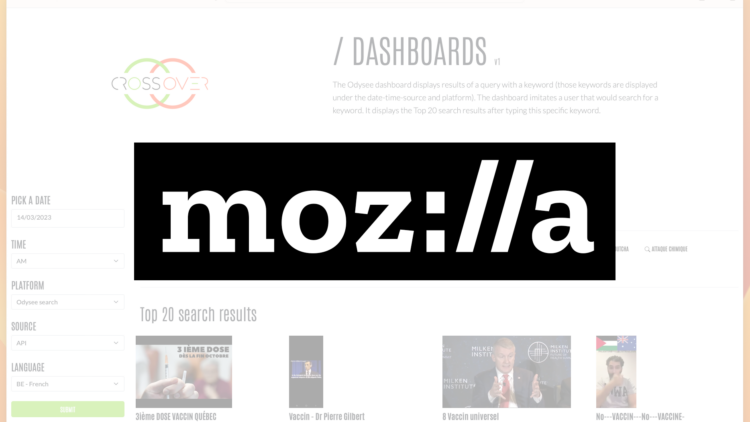[INTERVIEW] Check First
Check First is a Finnish software and methodologies start-up that helps journalists, citizens and policy makers fight disinformation all around the globe.
What does Check First do?
Guillaume Kuster: “Check First was born from a common vision from its co-founders: empowering people with quality tools and methodologies in order to slow down the spread of disinformation and learn on the way the best possible techniques to eventually tackle it.”
“The founders met online as they were building a spontaneous debunking initiative in the first weeks of the global pandemic, tackling mis- and disinformation related COVID-19 content. This entirely open newsroom welcomed 120+ contributors for which a safe and efficient workflow had to be designed from the ground up. How to trust newcomers without ever having met them? How to be sure to remain rigorous as the number of team members grew? How to ensure constant quality in the fact-checking process? These are just a few of the questions Check First’s founders had to figure out but successfully achieved by building editorial tools, processes, onboarding programmes and more to turn the operation into a hit.”
“After Check First’s creation, one of its first projects was to collaborate with the Organisation internationale de la Francophonie, an organisation of 88 states and governments where the French language is either spoken or of interest. The company conducted studies about French language initiatives fighting disinformation and helped create ODIL, a platform gathering 60+ initiatives among which are fact-checking organisations, media-literacy organizations, academia and more.”
Why is Check First collaborating in the CrossOver-project?
Guillaume: “Accountability is at the core of Check First’s values. We believe in transparency as a way to communicate, work and govern. However, very big platforms such as Facebook or Youtube are infamously not transparent. Such platforms have a huge amount of power at disposal to expose their users to certain types of content. The general belief is that content recommendation algorithms are designed to keep users on a given platform as long as possible in order to maximise profits. A terrible side effect of designing such a tool is that computers can’t tell nefarious content from thoroughly researched and valid content, which means that users can be exposed to a series of fake, even dangerous content entirely automatically, without human intervention. We think that platforms must be held accountable for this. Monitoring how their content recommendation algorithms work is the first step to document how these systems work, depending on the profile of the users.”
What will Check First do in the CrossOver-project?
Guillaume: “Check First’s main task is to develop a dashboard of automated content spread in Belgium. This means that we are developing tools to monitor social media platforms, starting with Google search’s auto-complete and Twitter trends and observing which content they recommend to their users. This data will be publicly available, as well as the full methodology, so that anyone can see which topics appear to be the most recommended algorithmically.
We will also conduct open source intelligence investigations together with Apache, offering our skills to support their quality journalistic work.”
How do you think we should tackle disinformation?
Guillaume: “Tackling disinformation is obviously a very tricky problem as it is immensely complex and involves many stakeholders and behaviours, from the nefarious actors creating disinformation to the end users or spreader without forgetting about governments and their bodies of regulations that can be circumvented and of course any social media amplifying platform. We believe that the best way to mitigate disinformation is by media literacy and teaching the younger generations how to gauge a piece of information. But this will take time. In the meantime, we think that technical solutions, together with good journalism, can lead to public exposure of both disinformation and amplifying factors. This must lead to a raise in the general awareness of the ways and methods by which mis- and disinformation spread and can as a consequence result in the shaping of clever regulation packages. We don’t think that the production of disinformation can ever be stopped but we’re sure that we can educate the receiving end to just dismiss it.”
CrossOver is a cross border and a multilingual project. How do you cope with those challenges?
Guillaume: “Belgium is a very interesting playfield for this project. The country is relatively small, but quite diverse. The language issue is certainly one of the factors which renders Belgium interesting, as its citizens are not only exposed to disinformation that was created within its borders, but also to any Dutch or French language piece of content. We will be able to observe how the language factor affects (if it does at all) the way disinformation circulates.”
On top of that, French and Dutch are not well served as regards the technical fight against disinformation. The vast majority of available tools are designed to work in English or analyse English.
Working in several languages is both a technical challenge, and a cultural one but the CrossOver team thought it through. The consortium is formed of both Dutch and French speaking entities which collaborate tightly together.”
![[INTERVIEW] Check First](https://crossover.social/wp-content/uploads/2021/12/Check-First.png)
![[INTERVIEW] Apache](https://crossover.social/wp-content/uploads/2021/12/Apache-750x422.png)
![[INTERVIEW] Savoir*Devenir](https://crossover.social/wp-content/uploads/2021/12/Savoir-Devenir-750x422.png)
![[INTERVIEW] EU DisinfoLab](https://crossover.social/wp-content/uploads/2021/12/EU-Disinfo-750x422.png)
